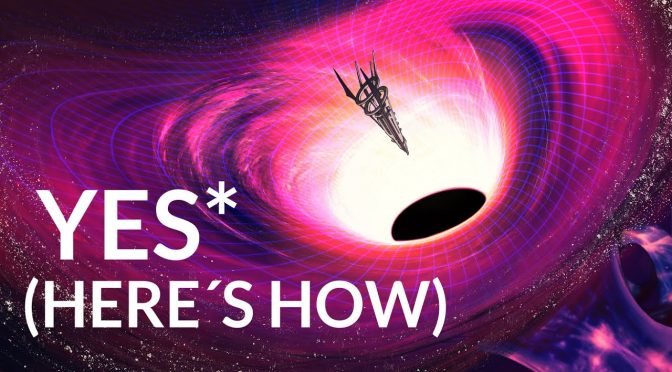Delve into the intricate world of time travel, where we unravel the mysteries surrounding it and tackle the paradoxes it presents. The YouTube channel History of the Universe takes us on a fascinating journey, highlighting how time travel to the future is already possible and examining the complexities of traveling to the past. This article dissects the video’s content to bring you thought-provoking discussions about the deep philosophical aspects of time travel and its implications.
Time Dilation and Traveling to the Future
The video explores the concept of time travel to the future through the phenomenon of relativistic time dilation. Experiments with muons, unstable particles created by cosmic rays, provide evidence that traveling to the future is possible due to the differences in the aging rate of particles moving at close to the speed of light.
Wormholes and Time Travel to the Past
The possibility of traveling backward in time without breaking the light speed barrier is discussed through the concept of wormholes. The video suggests that wormholes might allow for time travel to the past by transporting a person not only through space but also to a different point in time. This intriguing idea raises further questions about the paradoxes associated with time travel.
The Bootstrap Paradox and Eternalism
Time travel can give rise to perplexing paradoxes, such as the Bootstrap Paradox, where a letter appears to have no origin due to a time loop. Eternalism or the block universe theory suggests that time is a river, with past, present, and future coexisting simultaneously. By looking at spacetime as a malleable, four-dimensional block, we may start to grasp the concept of all moments in time coexisting, thus allowing time travel to be possible.
The Enigma of Origin
It is the Bootstrap Paradox that initially challenges the reader to question the nature of cause and effect in this time travel narrative. When the older version of the protagonist retrieves the letter given to their younger self, they perpetuate a seemingly creatorless artifact caught in an eternal loop. This puzzling circumstance defies our conventional understanding of linear causality and raises questions about the origin of the letter, as well as the circumstances that set this sequence of events into motion.
The Restoration Paradox: Endlessly Aging Artifacts
Another layer of philosophical inquiry is revealed through the Restoration Paradox. While the protagonist is caught in a cycle of saving themselves and subsequently dying, the letter appears to exist independently from the loop. As the time loop continues to repeat, does the letter continue to age, becoming increasingly worn and tattered? This paradox compels us to consider the nature of objects and artifacts within the context of time travel, and whether their physical properties remain constant despite the passage of time within a temporal loop.
Cycles of Existence: Freedom and Predetermination
The narrative of self-sacrifice and salvation presents a cyclical pattern of existence, with the protagonist continually living and dying. This raises deeper questions about the nature of free will and the extent to which our lives are predetermined. As the protagonist appears to be fated to follow this trajectory, does this imply that they are trapped in a cycle devoid of autonomy? If so, how can the concept of free will be reconciled with the inevitability of these predetermined events? These philosophical dilemmas compel us to reflect on the broader implications of time travel and the constraints it may impose on our understanding of freedom and choice.
The Grandfather Paradox: Limits on Causality
The Grandfather Paradox is a renowned thought experiment within the realm of time travel. It questions the very foundations of causality and temporal continuity by posing the hypothetical scenario where an individual travels back in time and inadvertently eliminates their own grandfather, thus preventing their existence. By doing so, the paradox presents a logical conundrum, as it challenges the linear nature of cause and effect and forces us to confront the limits of our understanding of the temporal order.
Chronology Protection Conjecture: An Immutable Universe
Stephen Hawking’s Chronology Protection Conjecture offers one way to address the Grandfather Paradox. Hawking posits that the universe prevents backward time travel by eliminating any opportunity for individuals to disrupt the past, effectively safeguarding the sanctity of cause and effect. This conjecture implies that the temporal order remains inviolable, as the universe actively preserves the past from any potential interference. Consequently, the Chronology Protection Conjecture presents a theoretical framework that supports the impossibility of backward time travel and maintains the integrity of the causal chain.
Novikov’s Self-Consistency Principle: Unchangeable Past
Igor Novikov’s Self-Consistency Principle provides an alternative resolution to the Grandfather Paradox. Unlike Hawking’s conjecture, Novikov’s principle allows for the possibility of backward time travel. However, it contends that individuals cannot alter events that have already transpired. Essentially, the past remains unchangeable, even when visited through time travel, ensuring that the sequence of events remains consistent with established history. This principle allows for a more flexible understanding of time travel while still preserving the crucial relationship between cause and effect in the temporal landscape.
Free Will and Determinism in a Time-Traveling Universe
Time travel challenges our understanding of free will and determinism, as it raises questions about whether our actions are predetermined or a product of choice. Novikov’s self-consistency principle posits that we cannot change what has already happened in the past, while the many-worlds interpretation of quantum mechanics suggests that every possible outcome of an event takes place in branching parallel universes. These theories help address the paradoxes associated with time travel, and provoke profound contemplation about the nature of reality.
Credits
“Is Time Travel Possible In Our Universe?” is brought to you by the YouTube channel History of the Universe, with research and writing by Colin Stuart, editing by Manuel Rubio, narration and script editing by David Kelly, thumbnail art by Ettore Mazza, and animations by Jero Squartini.

